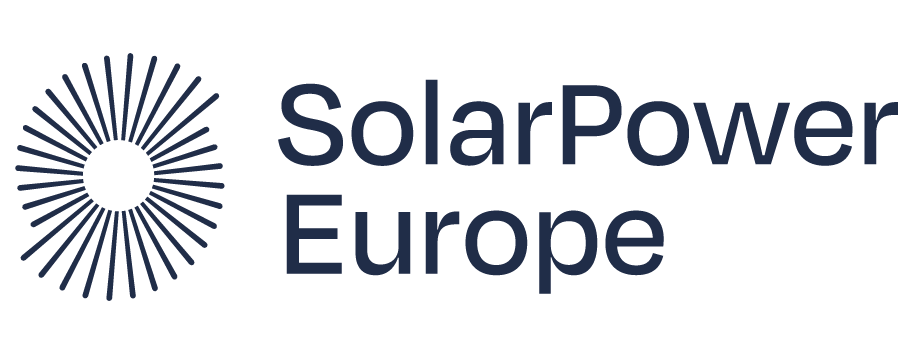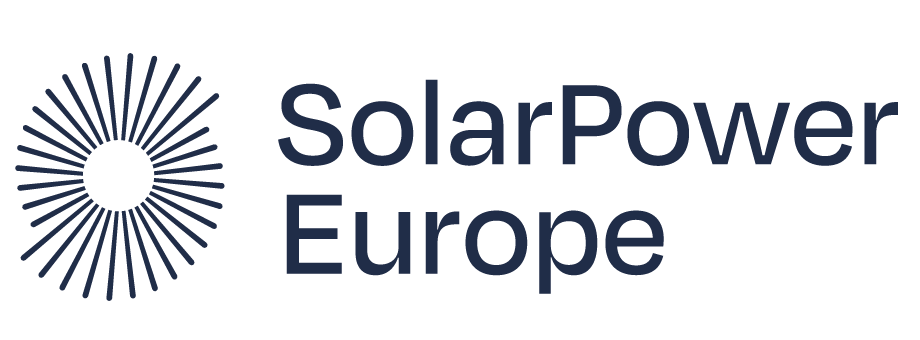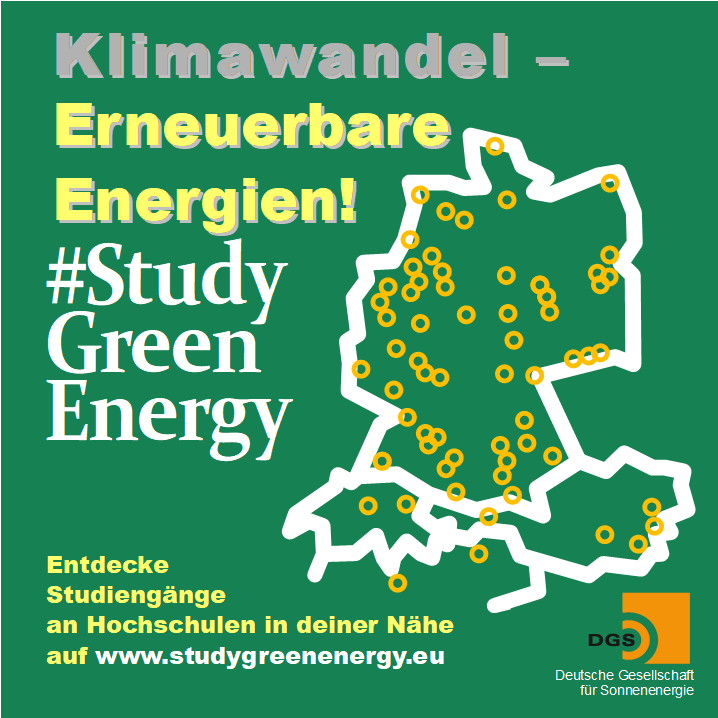Photovoltaics Engineering Science (M.Sc.)
Department of of Electrical, Mechanical and Industrial Engineering
Major Fields of study
- Physics of the Solar Cell
- Crystalline and Thin Film Solar Cells
- Solar Modules and Components
- System Design, Monitoring, Yield and Performance Analysis
- Solar Cell and System Reliability
- Storage Systems, Electric Grids and Solar Energy Integration
Degree
Master of Science
Department
of Electrical, Mechanical and Industrial Engineering
Location
Köthen
Duration
3 semesters
Program Start
winter semester or summer semester
Sem Contribution
96 euros
Application period
International Uni Assist15.03. – 15.07. (winter)
15.09. – 15.01. (summer)
15.03. – 15.07. (winter)
15.09. – 15.01. (summer)
Course content and objectives
Photovoltaics Engineering Science is a 3 semesters Master’s program in English language, which requires a Bachelor’s degree in engineering science or physics. No professional experience is needed. It consists of 2 semesters courses in solar cell physics, technology of crystalline silicon and thin-film solar cells and modules, cell and materials characterization, components of a PV system and their reliability, system design, monitoring, yield and performance analysis, storage systems, power electronics, and electric grids and solar energy integration. The technical subjects will be accompanied by a course in business administration, and voluntary courses in German language for daily life (which are not credited; usually at beginner level). A final research semester under supervision of a professor from the university concludes the program. The courses combine lectures with exercises, seminars or practical laboratory work. The tuition in compact form will build up on a requested solid basis of knowledge in mathematics, physics, chemistry (or materials science), fundamentals of electrical engineering and semiconductor technology, and scientific methodology, which the applicant is expected to have acquired in a previous Bachelor's program. The research for the Master’s thesis can be performed in the PV laboratory of Anhalt University, at the Fraunhofer Center for Silicon Photovoltaics CSP (in nearby city of Halle), or in any other PV laboratory or any PV company worldwide.
Requirements
-
University degree
An academic degree in engineering science, physics or related fields of study of at least 7 semesters (210 credits) is required.
-
Language skills
English language proficiency by appropriate scores of TOEFL min. 90 pts. (ibT) , IELTS min. 6.0 or similar tests (e.g. TOEIC, Cambridge Certificate) with minimum B2 level according to the GER (common european framework of reference for languages). An evidenced graduation from an English-medium college or university is also accepted.
-
Aptitude test procedure
1. final grade first academic degree:
- overall grades up to 2.5 (German grading scale) go into the selection process
- overall grades > 2.5 (German grading scale) cannot be admitted
2. other criteria:
- letter of motivation (at most one A4 page)
- pertinence of the Bachelor's degree program
- proficiency in English (at least B2)
- CV (complete and up-to-date)
- summary of the Bachelor's degree thesis (to evaluate the ability of scientic working and writing; one A4 page + list of cited references)
- if necessary, online interview
Career Opportunities
Graduates of the Master’s program Photovoltaics Engineering Science will be qualified to work as engineers in research and development, production of cells and modules, design, construction, operation or management of photovoltaic power plants. Due to the forecast strong increase of photovoltaic power generation, especially in the sun-rich countries around the world, excellent job perspectives are expected.
Therefore, this program is especially well suited for students from countries, in which PV is currently strongly growing, and who want to participate in this process after having graduated. Although Germany is still a leading nation in research and development in PV, most of the production has meanwhile moved to the Far East, and the installation of big new PV power plants to the sun-rich countries all over the world.
But due to Germany´s ambitious plans for the energy transition, the world-wide necessity to fight the climate change, a certain recovery of the German PV manufacturing industry, and increasing lack of qualified engineers in the German job market, opportunities for foreign employees in German companies are expected to improve in the future, especially for those applicants with at least a medium knowledge of the German language.
Program-specific questions
Organizational questions
General Questions
(not program-specific)Notes
- Program in English language
Deadlines
Pre-assessment (strongly recommended for all applicants):
- for winter semester: June 15
- for summer semester: December 15
The pre-assessment period starts 3 months before the deadline.
Uni-assist (for applicants from abroad, especially non-EU countries):
- for winter semester: July 15
- for summer semester: January 15
The application period starts 4 months before the deadline.
To have a realistic chance of getting your visa (if needed) in time, we recommend that you apply as far in advance of these deadlines as possible!
SSC application portal (for applicants with a German bachelor's degree):
- for winter semester: July 15
- for summer semester: January 15
For applicants from Germany later dates can also be made possible in exceptional cases; in this case please contact the Degree Program Coordinator or the Degree Program Advisor by email.
The winter semester starts on the first working day in October, the summer semester starts on the first working day in April.
Preparatory Online Course
Parallel to the summer semester a preparatory online course on basics of mathematics, physics and chemistry is offered for potential applicants free of charge (for contents, please refer to module description under folder "Documents"). The course is intended for perspecitve students who are not sure whether their knowledge in these basic subjects is sufficient for the program.
The course takes place every Monday (except public holidays in Germany) from 4:30 - 6:00 p.m. (lecture) and 6:15 - 7:45 p.m. (exercises) Central European Summer Time (CEST = GMT plus 2 hours). Period of summer semester: April, 1st, to July, 12th. Public holidays: Easter Monday (April, 1st), Whit Monday (May, 20th).
You are invited to join via the link: https://hs-anhalt.webex.com/hs-anhalt/j.php?MTID=m604b85ee60355f6f3c17c39516ba58e7
PLEASE NOTE: The Preparatory Course can just start from 27th May!
Alternativey you can send an email to norbert.bernhard(at)hs-anhalt.de Prof. Bernhard will send you a Webex invitation to the whole course (it is not necessary to install Webex at your computer!).
You can, of course, also attend only the lecture, or just parts of the lecture. The first third of the course covers chemistry, the second third mathematics and the last third physics.
Fees
A service fee of €90 is charged per semester for the Students Services Agency (Studentenwerk); plus €6 for the Student Union. The Studentenwerk supports you in social aspects free of further charges (e.g. administration of students' accommodation, cheap meals in the students' refectory, free legal advice and other kind of social support).
No tuition fees are charged.
Uni-assist charges a fee of €75 for its assessment of your documents (€30 for every additional application if you apply for more than one program).
Prerequisites for the program
- Completed bachelor's degree program of at least 7 semesters (equivalent to 210 ECTS points) in:
- Electrical Engineering
- Physics
- Physics Engineering or equivalent
- Materials Science or equivalent
Other bachelor’s degrees in engineering sciences are accepted if the program covers the following subjects to a sufficient extent: Mathematics, Physics, Chemistry or Materials Science, Basics of Electrical Engineering and Semiconductor Technology.
- Minimum grade of your bachelor's degree: 2.5 (converted to German system by the Bavarian formula (Bayerische Formel) as shown at the end of the page)
- University rating according to Anabin list: H+
- Proven ability to work scientifically and write scientific texts: Usually shown by the final thesis / final project of the bachelor’s degree program
- Knowledge of oral and written English at least of level B2 (according to the European reference framework for languages)
Equivalent scores by other tests are roughly:
- TOEFL: PBT=600, CBT=250 or iBT=100 points
- IELTS: 6.0
- TOEIC, Cambridge Certificate or any other test equivalent to level B2 (according to the European reference framework for languages)
DUOLINGO tests cannot be accepted.
If the bachelor’s degree was awarded by an English language program, an official confirmation of this fact is sufficient.
No knowledge of German is necessary for the program. (However, it can be helpful in daily life.)
Applicants from India need a valid APS certificate when applying at uni-assist.
Exemption for application for winter semester 2023/2024: You can upload your certificate until September 30. Uni-assist will check your application even with a delayed APS certificate.
Pre-assessment (not compulsory, but strongly recommended):
We offer an informal pre-assessment free of charge before you apply at uni-assist. Pre-assessment starts 3 months before the deadline for the respective semester (see deadlines above). The purpose is to clarify your chances before you spend the money for the uni-assist process. Another advantage is that you will know about your admission earlier than by directly applying at uni-assist.
For this purpose, please send an email to mpv(at)hs-anhalt.de before the deadline (see above), but not more than 3 months before that deadline.
The sender email address should have the format: given_name.surname(at)organisation.xx (if your name is very common in your home country, an additional identifier may be added after your surname). The email should contain a short address in business style, ending with your name, address and phone number and must have attached the following documents in one single pdf-file named "pre-assessment_given_name_surname":
- CV: It must be fully up-to-date, i.e. up to the day of sending; and it must not contain any gaps (if there are periods of unemployment or similar, please add them with start and end date). It should also contain a photograph, your date of birth, your skills level of foreign languages and computer programming languages.
- Motivation letter (at most one A4 page, font size 11, line spacing 1.2, margin 2.5 cm, in a well-structured fashion): It should clearly state why you want to study Photovoltaics Engineering Science and why you have chosen Anhalt University. Please do not write a second narrative CV! Please avoid general formulations, platitudes and anything which is not related to your motivation with respect to the master's degree program in Photovoltaics Engineering (M.Sc.) or the choice of Anhalt University.
- Transcript of your bachelor’s degree certificate including grades: If not available at application, please provide a preliminary document. Please add your total final grade converted to the German grading system in a comprehensible way (by using the Bavarian formula, see at the end of the page).
- Summary (one A4 page, font size 11, line spacing 1.2, margin 2.5 cm) of your final thesis / final project: written in scientific style (as you would write a scientific summary), well-structured, showing your investigation objective, your scientific methodology and your results. Add a second page with the most important references in correct scientific citation (which all must be referred to in your text on the first page). If your final project was done jointly by more than one student, please include an explanation of your part at the bottom of the second page. This summary is very important for the assessment of your abilities of doing research and writing a scientific paper, therefore it is worth to put some effort into it.
Please don't add any further documents! Please send one single mail with one single attachment. Check the mail and the attachment whether it complies with above requirements before sending. Please avoid to send multiple mails with varying content or attachments!
Every applicant who submits the requested documents to the required standard will be invited for an online interview, in which we check his/her motivation and basic knowledge in math, physics, chemistry and electrical engineering. For those who perform well in this interview we will give a recommendation to apply at uni-assist afterwards. Everybody who passes the formal uni-assist check will then be accepted automatically as a new student.
Application via uni-assist
We recommend submitting your application as early as possible, but not before you have the results of your pre-assessment. According to uni-assist the evaluation process usually takes 28 to 42 days, in exceptional cases up to 56 days.
The application must contain the same documents as for the pre-assessment (see above) plus the language certificate (and possibly further documents, if requested by the uni-assist portal). The process is fully online by uploading your documents. The transcript of your university certificate (and possibly further documents – check the uni-assist portal) must be officially notarized. No reference letters or similar are necessary.
Check the uni-assist portal as early as possible for your country-specific requirements!
Uni-assist will perform a formal check of your documents. For students from most universities of some countries (especially India, Pakistan, Bangladesh and Afghanistan, but also others) usually an 8-semester bachelor’s degree program is assessed to be equivalent to only 6 German semesters. Since our program requires at least 7 semesters (according to German standard), an admission is then only possible with one additional bridging semester. For electrical engineers we can offer such a bridging semester in English, for other applicants only in German. Only in this case is knowledge of German at level B2 necessary.
You can also apply at uni-assist without pre-assessment, but we do not recommend doing so.
Application via SSC portal
Applicants with a bachelor’s degree from a German university do not have to apply at uni-assist, they can directly apply via the SSC portal free of charge (online upload of documents).
The same might be the case for EU applicants (or applicants from other European countries such as Switzerland, Norway or the UK) with a bachelor’s degree from their home university or another EU university if it is clear that their bachelor's degree is equivalent to a German bachelor’s degree. In such a case, please contact the Degree Program Advisor or the Degree Program Coordinator.
The same documents as for the pre-assessment have to be provided (plus further documents if requested in the portal). The bachelor’s transcript must be officially notarized. Participation in the pre-assessment process is also recommended for such applicants.
#SolarWorks
Degree Program Advisor

Degree Program Coordinator

Bavarian formula (Bayerische Formel)

A grading in letters A, B, C, ... must be converted to numbers: A=1, B=2, C=3, ...
If the total worst passing grade is different from the worst passing grades of individual subjects, the total worst pass grade has to be used.
General information
Curriculum (valid from winter semester 2021/2022)
Module Manual
Preparatory Online Course
Program and Examination Regulations (in German)
Degree Program Advisor

Degree Program Coordinator

News and events in teaching, learning and research in the field of photovoltaics
For more news and updates follow us also on LinkedIn
News and events
#StudyGreenEnergy
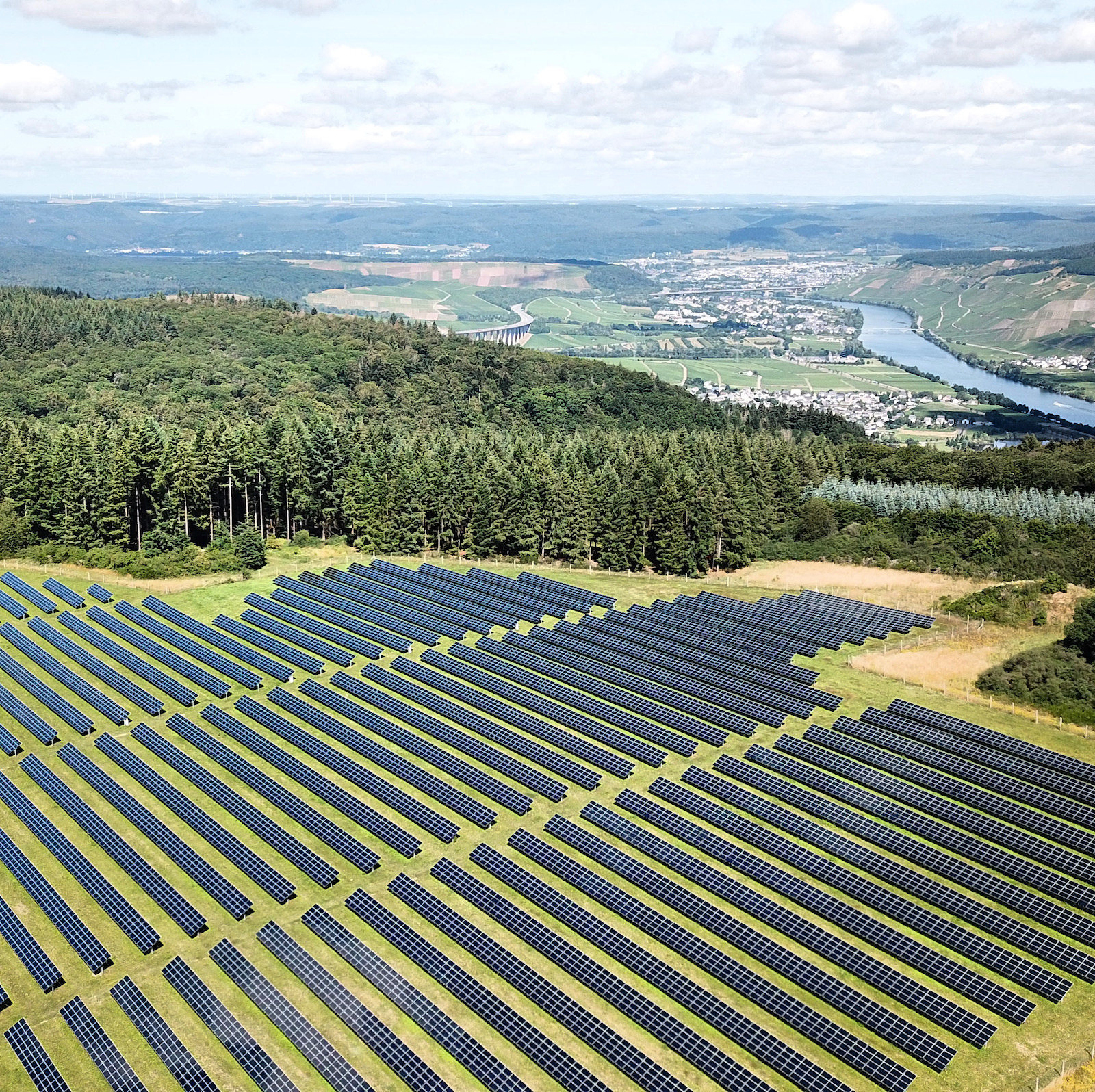
Gemeinsam das Klima schützen, im Team neue Lösungen für technische Fragen zu Wasserkraft, Wind- und Sonnenenergie finden und dafür auch noch gut bezahlt werden? Das gemeinsame Hochschulnetzwerk der "Deutschen Gesellschaft für Sonnenenergie" informiert über Studienangebote in Deutschland, Österreich und der Schweiz, geben Tipps zu den Voraussetzungen für ein Studium und Ausblicke auf vielfältige Karrieremöglichkeiten als Ingenieur*in mit Schwerpunkt Umwelt- und Klimaschutz.
Jetzt das passende Studium finden und schon bald die Energiewende aktiv mitgestalten! Informiere dich auf www.studygreenenergy.eu.
#SolarWorks
Solar power is set to become Europe’s main source of energy before the end of the decade. By 2050, solar jobs in Europe could grow to a staggering 4 million!
Europe’s goal of becoming climate neutral will not happen unless there are enough installers, project managers, accountants, engineers, sales advisors, ... People with all kinds of skills, including you!
To meet the enormous solar potential, we need millions of people to join the solar workforce to drive the energy transition. Let’s get to work!
Research projects in the field of PV technologies
-
StrukturSolar
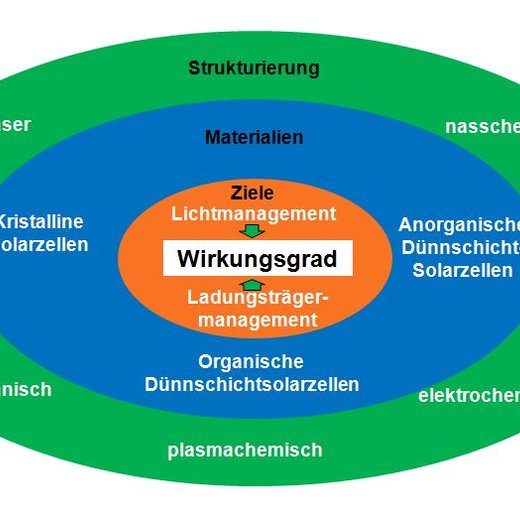
Projektstruktur Struktur Solar
Kooperative Forschungskolleg - StrukturSolar - Innovative Strukturierungskonzepte für Solarzellen der nächsten Generation (Förderkennzeichen 03SF0417A)
... ist eines von sieben vom Bundesministerium für Forschung und Technologie (BMBF) geförderten Pilotprojekten, in dem die Kompetenzen von Fachhochschulen in der angewandten Forschung und von Universitäten in der Grundlagenforschung in einem gemeinsamen Forschungsvorhaben sich komplementär ergänzend genutzt werden sollen. Kern sind von beiden Hochschulen gemeinsam betreute Forschungsarbeiten junger Nachwuchswissenschaftler, die sich mit ihrer Forschung durch eine Promotion weiterqualifizieren wollen.
Verschiedene Strukturierungsmethoden (plasmachemisch, nass- und elektrochemisch, mechanisch, durch Laser), mit denen die Hochschule Anhalt und die Martin-Luther-Universität anwendungs- und grundlagenorientierte Forschungs- und Entwicklungserfahrung besitzen, sollen in innovativen Konzepten zur Optimierung des Licht- und Ladungsträgermanagements in Solarzellen eingesetzt werden. Dabei soll von Anfang an eine kostengünstige technologische Umsetzbarkeit im Auge behalten werden, so dass die Forschungsarbeiten zur Wirkungsgradsteigerung von Solarzellen bei verhältnismäßig geringerer Kostensteigerung in der Herstellung führen können. Es werden sowohl kristalline Siliziumsolarzellen (mit der Zielrichtung geringerer Scheibendicke als heute üblich) als auch Dünnschichtsolarzellen (Kupfer-Indium/Gallium-Diselenid (CIGS) und organische Solarzellen) untersucht.
Acht wissenschaftliche Mitarbeiter arbeiten als Doktoranden unter der Betreuung von 13 Hochschullehrern und Forschern beider Hochschulen an verschiedenen sich ergänzenden Forschungsaufgaben des Projektes. Die 13 beteiligten Hochschullehrer und Forscher besitzen materialwissenschaftlich und technologisch orientierte Kompetenzen in der Photovoltaik sowie Methodenkenntnisse in den genannten Strukturierungsverfahren oder in relevanten wissenschaftlichen Analysemethoden zur Material- oder Solarzellencharakterisierung.
Nach dem erfolgreichen Abschluss von StrukturSolar am 30. 9. 2015 wurde die die Förderung des Anschlussprojektes StrukturSolar II vom 1. 10. 2015 bis zum 30. 9. 2018 gewährt. Forschungsinhalt ist die Fortführung von besonders erfolgreichen Themen aus der ersten Phase, teilweise mit neuer Schwerpunktsetzung, aber auch einiger neuer Themen, wie PERC (Passivated Emitter and Rear Contact)-Zellen oder Perowskit/Silizium-Tandemzellen sein.
-
LASER-PV
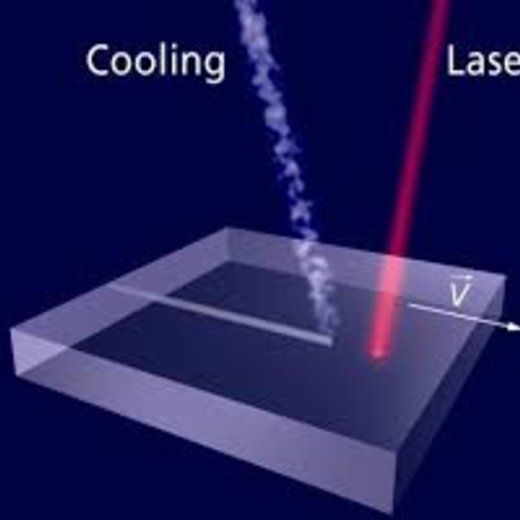
Prinzipdarstellung des TLS-Prozesses
BMBF-Förderprogramm "IngenieurNachwuchs – Kooperative Promotionen" - LASER-PV - Einsatz von Lasertrennverfahren in der Photovoltaik
Förderzeitraum: 01.10.2014 - 30.09.2017
Kooperationspartner: Fraunhofer IISB, ISE und CSP, Hanwha Q-Cells, 3D-Micromac
Inhalt des Projektes sind Grundlagenuntersuchungen und Prozessoptimierung zum neuartigen Verfahren der thermischen Laser-Separierung (TLS) bei der Trennung von Silizium-, Germanium- und Galliumarsenid-Scheiben für die Anwendung in der (konzentrierenden) Photovoltaik. Hinzu kommen vergleichende Untersuchungen mit den Referenzprozessen: ablative Laser-Trennung (ggf. in Kombination mit mechanischem Brechen) und mechanisches Sägen.
-
Solar-TLS
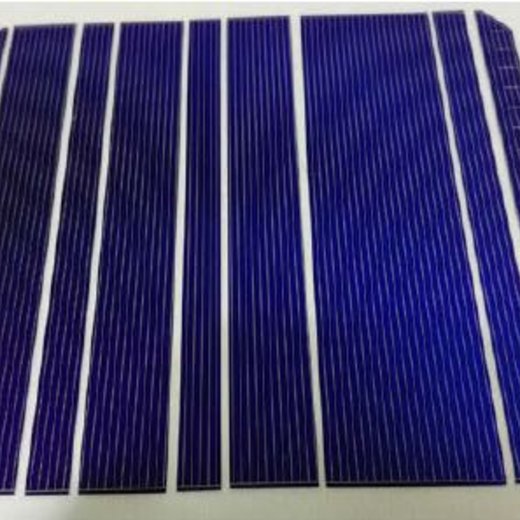
Bifaziale Solarzelle mittels TLS-Verfahren geteilt
Verbundprojekt - Solar-TLS - Entwicklung neuartiger und fertigungstauglicher Solarzelltrennverfahren basierend auf "Thermal Laser Separation"
Projektlaufzeit: 01.05.2016 - 30.04.2018, kostenneutral auf den 31.10.2018 verlängert
Projektpartner: 3D-Micromac Chemnitz, Fraunhofer CSP Halle (S.)
In einem Verbundprojekt wurden zum Verfahren der Thermischen Laser Separierung Forschungs- und Entwicklungsarbeit durchgeführt mit dem Ziel fertigungstaugliche TLS-Verfahren zur Herstellung von Silizium-Halbzellen für Hochleistungsmodule (oder Teilzellen für SOndermodule) zu entwickeln. Der Hauptfokus lag auf der Ersetzung der normalerweise verwendeten Aerosol-Kühlung auf einen Trockenkühlungsprozess. Dazu wurde an der TLS-Anlage der HSA eine Wirbelrohrdüse installiert und ein entsprechender Trockenkühlungsprozess entwickelt.Es wurden gleichermaßen multi- und mono-kristalline Si-Solarzellen auf Basis der PERC-Technologie untersucht. In einem letzten Arbeitspaket wurden Trennversuche an Bifazial-Zellen erfolgreich durchgeführt.
-
Black-SiN
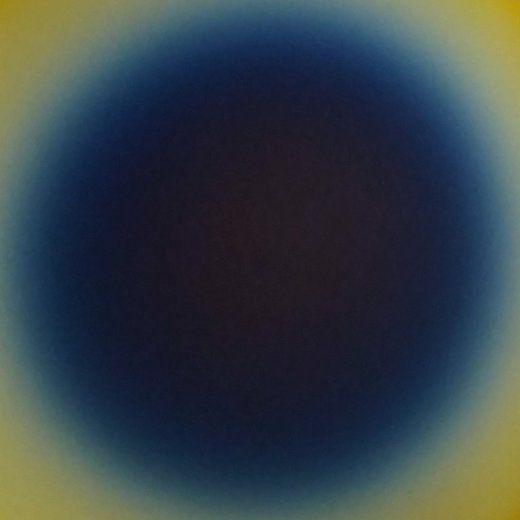
Fotografie einer plasmatexturierten Siliziumnitrid-Schicht
Verbundprojekt - "Black SiN" - Maskenlose Plasmatexturierung von Siliziumnitrid
Laufzeit: Das vom Land Sachsen-Anhalt geförderte EFRE-Projekt wurde für die Laufzeit vom 01.04.2018 bis zum 31.03.2020 genehmigt.
Mit Stand vom 12.03.2020 konnte die Laufzeit das Projektes aufwands- und kostenneutral bis zum 31.05.2020 verlängert werden.
Projektpartner: Fraunhofer-Center für Silizium-Photovoltaik CSP, Halle (Saale)
In dem aktuellen Forschungsprojekt Black SiN forschen Prof. Bernhard und sein Team von wissenschaftlichen Mitarbeitern an der Verringerung des Reflexionsgrades – und damit verbesserten Lichtaufnahme – von industriellen Silizium-Solarzellen. In Kooperation mit dem Fraunhofer-Center für Silizium-Photovoltaik CSP in Halle (Saale) wird im Rahmen des Projektes an der maskenlosen Plasmatexturierung von Siliziumnitrid-Schichten geforscht, ohne den darunter liegenden Silizium-Wafer zu beschädigen. Aus der erhöhten Lichtabsorption folgt eine Verbesserung des Solarzellenwirkungsgrades. Das zum Patent angemeldete Verfahren soll schlussendlich auf die industrielle Produktion übertragen werden.
-
MILLEFEUILLE
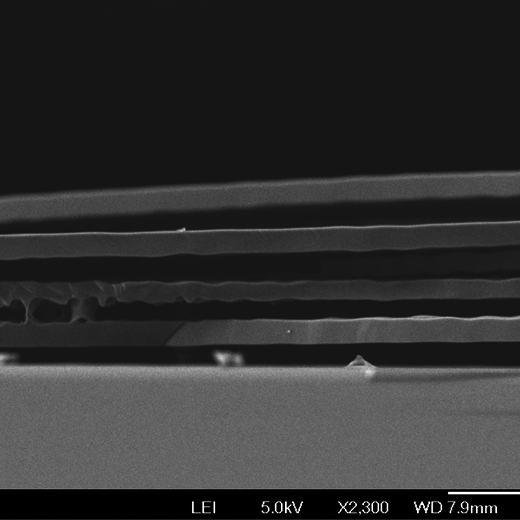
REM-Aufnahme multipler ultradünner Siliziumwafer
Verbundprojekt – MILLEFEUILLE – Materialien und Technologien für die direkte Herstellung von multiplen ultradünnen Silziumwafern
Zeitraum 01.08.2017 – 30.09.2021
Projektpartner: Smartmembranes, Halle (S.)
Das Ziel des Projektvorhabens MILLEFEUILLE ist die Bereitstellung von wissenschaftlichen und technologischen Grundlagen für die kosteneffiziente und skalierbare (d.h. in eine industrielle Fertigung übertragbare) Herstellung von ultradünnen monokristallinen Siliziumwafern unter Verwendung des Millefeuille-Verfahrens sowie der Nachweis deren Texturierbarkeit durch ein maskenloses Plasma-Ätzverfahren.
Der Schwerpunkt des Vorhabens liegt in der Entwicklung und Evaluierung neuer Verfahren und Technologien für die Fertigung ultradünner monokristalliner Siliziumwafer (10 µm - 50 µm) aus 3D-makroporösem Silizium in einem Prozessschritt ("Millefeuille") durch Tiefenmodulation des photo-elektrochemischen Ätzprozesses mit anschließender Temperung sowie deren wirkungsvoller Plasma-Texturierung zur Erreichung einer hinreichenden Lichtabsorption durch Reduktion der Reflexion und wirkungsvolle Lichtfallen-Strukturen für die Anwendung in der Photovoltaik.
Die Förderung durch die Investitionsbank Sachsen-Anhalt und die Europäische Union im Rahmen des EFRE-Programmes wird dankend gewürdigt.
Erweiterte Fassung bei EUPVSEC eingereicht: Abstract
-
LeTID-Norm

Logo des LeTID-Konsortiums
Verbundprojekt - LeTID-Norm - Entwicklung einer Prüfnorm für die Licht- und Temperatur-induzierte Degradation (LeTID) von hocheffizienten Solarzellen und -modulen
Projektlaufzeit: 01.01.2019 – 31.12.2020 (verlängert bis 30.06.2021)
Projektpartner: Fraunhofer Center for Silicon Photovoltaics CSP, Anhalt University of Applied Science, centrotherm international AG, DKE German Commission for Electrical, Electronic & Information Technologies of DIN and VDE, Hanwha Q Cells, Wavelabs GmbH
Assoziierte Partner: Mayer Burger AG, LayTec AG, IBC Solar AGThe project LeTID-Norm receives funding within the WIPANO program of the German Federal Ministry for Economic Affairs and Energy (BMWi).
In recent years a new type of degradation called LeTID which can lead to significant power losses in solar cells has become a focus of discussion. LeTID stands for Light and Elevated Temperature Induced Degradation. Cells with innovative designs like PERC technology show an even stronger effect than cells with a standard setup.
At the moment, however, there is no standardized testing method to quantify the LeTID phenomenon. Currently available tests differ vastly regarding their parameters like the type of charge carrier injection and operating mode. The effects of enhanced temperature are often not considered.
The project LeTID-Norm aims at providing a harmonized approach to LeTID testing along the value chain of solar modules and establishing an integrated quality management system to avoid LeTID/LID losses. This approach will be proposed for standardization nationally and to IEC after the end of the project.
Further information: https://www.dke.de/de/arbeitsfelder/energy/letid-norm
Derzeit sind in diesem Bereich keine Angebote verfügbar.
